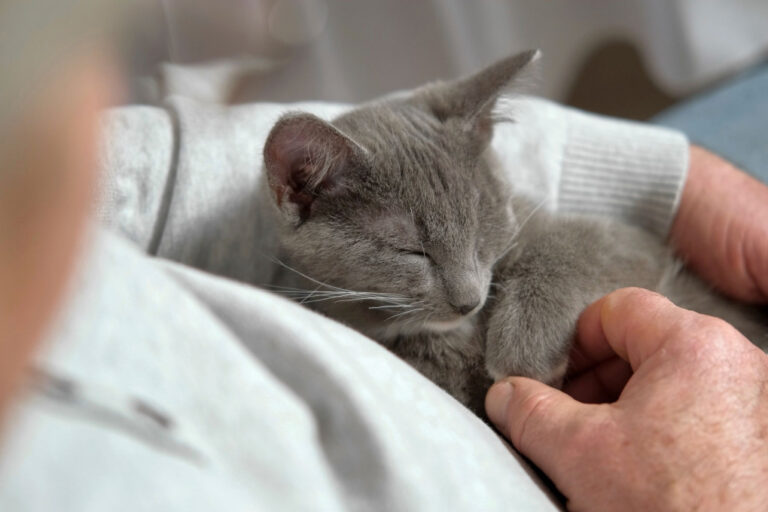-
Shop By Age
-
Kitten
Up to 1 year
-
Adult
1-6 years
-
Senior
7+ years

Can my cat get certified as a therapy cat?
Every cat owner and cat lover will understand why their kitties have the capacity to make perfect therapy pets. We’d all love to channel our inner feline by curling up into a ball when things are getting a bit too much.
01/03/2024
Every cat owner and cat lover will understand why their kitties have the capacity to make perfect therapy pets.
We’d all love to channel our inner feline by curling up into a ball when things are getting a bit too much.
Our beautiful bundles of fur are a picture of serenity, calm, relaxation and tranquillity at their most comfortable.
Sharing the same space as an animal emanating such serenity is bound to have an impact on your thoughts and feelings.
A little bit of love from our whiskered fur balls can go a long way to easing anxiety and alleviating stress.

What is the process for getting your cat therapy trained & certified?
Therapy cats are trained to provide emotional, psychological and/or physical support to human companions in need of healing.
They can aid men, women and children of all ages, who might suffer from a range of life-limiting disorders or disabilities.
Our doting and lovey-dovey domestic animals can stimulate the mind, body and soul of their pet-loving patients.
They can promote and enhance cognitive development and encourage exercise and interactivity through play and other means.
Their mild-mannered demeanour and tolerant temperament brings a calmness to what can sometimes be a stressful and intense situation.
Feline snuggle buddies often come in handy in hospitals, schools, nursing homes and other care facilities where warm cuddles are welcomed.
But to be able to provide this level of care and assistance, therapy cats need to have been through the necessary procedures.
They need to be properly trained and purr-fectly certified to gain their status and prove that they have the right personality for the job.
There are many organisations available to assess whether your pet meets the minimum requirements to qualify.
Analysis will include age, behaviour, diet and the tolerance of wearing a leash or harness, as well as a live evaluation by a trained professional.
Are there certain breeds of cat more suited to therapy?
There are certainly some breeds of cat more suited to therapy than others.
Temperament is generally more important than type when searching for the perfect pet partner.
But there are a handful of four-legged varieties that would be pushed to the back of the queue when it comes down to selection.
Those considered too aggressive, too possessive, intolerant, unsociable, unfriendly or inhospitable wouldn’t fit the bill.
Patients, many who are classified as ‘vulnerable’, require warmth, affection, devotion and a companion that is comfortable with human contact.
Burmese are widely considered to be the most loving and caring breed, which makes them the king/queen of cat companions.
American Shorthairs, meanwhile, are said to be gentle and attentive, particularly around children, and Siamese cats are renowned for being affectionate.
Others to consider are the Ragdoll, Balinese, Manx, and Russian Blue, whose calm temperament and warm-hearted personalities make them the perfect choice for the provision of emotional support.
Can you take your therapy cat on an aeroplane?
Arranging flight travel for therapy cats, or Emotional Support Animals in general, can feel like quite a chore at times.
Pet parents are made to jump through hoops and fill in the appropriate paperwork to get their four-legged travel buddy a place on the plane.
But planning and preparation is more than worthwhile ahead of a trip to the clouds as it will ensure the whole experience is as stress-free as possible.
First of all, be sure to book your journey with an airline that still permits therapy pets or ETAs to travel on their aircrafts, as some no longer consider them as service animals.
Also, please be aware that you can not officially certify/register a pet as an Emotional Support Animal, but you will require an ESA letter from a licensed medical health professional.
Psychologists, therapists, psychiatrists are all eligible to carry out assessments and determine whether travellers require an ESA to help manage their symptoms.
ESA’s also need a valid pet passport to fly on planes and will likely require a microchip, a rabies vaccination, an animal health certificate, parasite treatment and additional vaccinations.
Please double check to see what other documentation may be needed for your specific airline well in advance and, it should go without saying, ensure that cats are allowed, as the majority of companies only allow dogs on to their carriers.
Do all your due diligence in good time as it is better to be safe than sorry!
Therapy cats can change the way a person views the world
Therapy cats can significantly improve the quality of life for many who suffer from emotional, physical and/or psychological disorders or disabilities.
They can change the way their human patients view the outside world when situations become too overwhelming, problematic or traumatic.
Without saying a word, not even a reassuring ‘meow’, they can provide comfort for their companions with a simple snuggle, lots of love, and plenty of care and attention.
They just need the right temperament to qualify, a tolerance for prolonged human contact, and the personality to do whatever it takes to keep a smile on their new friend’s face.







